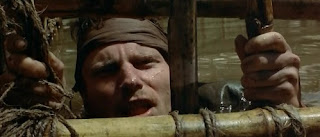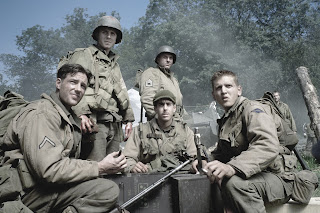Now we’re in the final week of my look at war films. It’s apparent now that the key thing that makes war films enjoyable is the human element to them. Rather than have it be dominated with gratuitous action and nothing else, for me personally it’s interesting to have a person or a group be changed by what happens in the battlefield. And I find it not surprising how it can be Oscar bait for winning awards including Best Picture. Like, it’s Shakespeare with the edge to make grown men cry. Anyways, this week is focused on Kathryn Bigelow. She’s one of those directors who can make a whole variety of genre films. I believe she is attributed to making Keanu Reeves an action star with her film Point Break. Even though I just watched her films from the early 2010s, I believe that The Hurt Locker is the best. Yes, it even earned her the title as the first female director to make a film that won Best Picture.
1. Sgt. William James
We all know him as Hawkeye in the Avengers film and in his upcoming show on Disney Plus, Jeremy Renner plays the bomb diffuser Sgt. James. Before that, I just want to talk about the beginning. Usually with these kinds of films, it sets up everything we need to know going forward. We don’t see him in the start, as we see just how obviously dangerous diffusing IEDs or Improvised Explosive Devices are.
With the guy we see attempting to do so, it goes wrong. The blast is compounded by the actual explosion with the slow motion. The use of it really emphasizes the overall power of the bomb, by showcasing the rubble rattle off the rusted car. It’s the perfect use of the aesthetic that really is the only way to show Slo-Mo. That and it's horrifying to even think that soldiers are trained to do this and in a matter of happenstance can change anything.
So we see Sgt. James as the expert diffuser. When paired with fellow Sgt. Sanborn and Specialist Eldridge, they go and attempt to diffuse IEDs that are lying around Baghdad. The knock on James is that when spotting a bomb, he wears the Bomb Suit. What’s nutty is that he peels it off and attempts to diffuse the explosives with little protection. When you watch him, clearly the first takeaway is that he’s crazy. Why on Earth any sane man would literally not wear any protective gear must have some screws loose.
Though, it would be too easy to make the character just one note and just say that he’s risky. And well that’s true since he loves the whole rush to find the wire and diffuse the bomb. What makes him more relatable is that he loves to joke and rough play. Additionally, he pokes fun with a young boy who calls himself Beckham. With that human side, we see just how James is during those brief moments that can easily wipe him out.
One of the film’s best moments is the overall tension that is shown when James and his trio go to the city to defuse the bomb. Making the situation more tense is when the terrorists blend in with the civilians. There’s constant chatter and we cut to James who’s attempting to find the wire to disarm the bomb. I think the best moment involving him is that we see a car that is loaded and James attempting to diffuse it. He goes above and beyond to cutting the cushion and ripping the radio to find the wire.
What is interesting is that he even collects mementos from his disarms. We hear from a brief conversation that he disarmed approximately 370 bombs. One of the mementos is the fuse that triggers the bombs. We see him toy around with it and I interpret it as it’s a sort of game to him. Perhaps as a way to let off some steam. Aside from the neutralizing of the bombs, it was good that the action is spiced up when he serves as a guide to Sgt. Sanborn who uses a sniper after being ambushed. Not only is he good at defusing, but he’s a more equipped person to scope out enemies in a few yards.
2. War as a Backdrop
I think the big takeaway for war movies is the not-so-subtle commentary. You have ones that have the cynic approach by saying that war is pointless or displaying some bravery as we’ve seen with the World War 2 films that I’ve touched on. I feel that with The Hurt Locker, there’s no need for subtle moments of morality. Most of that happened before and during the movie’s release. At it’s very core, we’re focused on a man’s unhealthy habit of diffusing bombs while becoming alienated from his partners.
I was surprised when there were moments when his partners talked and contemplated on killing him. I could understand that what James did was just risky, but to even have that showed that they could’ve had done it. I feel like with the overall backdrop, we see just how humane the soldiers are, near the end of the movie they want out. With the amount of heightened tension they experienced is justified. My other favorite scene is when James takes a shower with his uniform, and slowly peeling off the helmet. It just shows how much he’s gone through, and how it’s taken a toll.
3. Overall
This is one of the best film’s of the early 2000s. And the fact that a woman director could make a movie that engrossing without a touch of exaggerated testosterone is a feat for any director. Sometimes the movie hits you in places where you’re not ready. For the genre to continue to exist, you need to show the toll a soldier can take when it’s too much.
The Hurt Locker gets a five out of five.























































